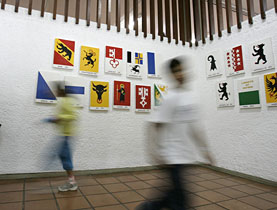Consular cutbacks prove painful

A decision by Switzerland to close its consulates in a number of cities has provoked angry reactions among Swiss living abroad and the consuls themselves.
The news was revealed on French-language public radio on Tuesday, which reported that 26 consulates in Europe, the Caribbean and southern Africa were being regrouped into eight regional centres.
The radio said the consuls had not been officially informed of the plans in advance and were furious at the “high-handed system of communication” and “inadequate personnel policy” of the foreign ministry.
Foreign ministry spokesman Adrian Sollberger responded to swissinfo.ch by email: “The Directorate for Resources has received various letters and is in contact with representatives of the consular staff.”
Among the capitals to lose a consulate are Copenhagen, Helsinki, Oslo, Brussels, Luxembourg, Budapest, Prague, Sofia and Port-au-Prince.
According to the radio report, the restructuring was carried out without officially informing the consuls, which has led to tension between them and Bern.
In a letter addressed to the individuals concerned, dated May 27, the foreign ministry explained the impact of the restructuring would be “minimal for career staff”, indicating that cuts were to be expected among the consulates’ local staff.
Ongoing problem
“We complain at almost every meeting of the Council of the Swiss Abroad about the reduction of consulates,” said the president of the Organisation for the Swiss Abroad (OSA) Jacques-Simon Eggly.
“Long before this new concept was revealed – at least now it’s a concept – there were closures taking place,” he added.
Eggly lists Toulouse, Hamburg, Dresden and Bordeaux as examples of consulates closed recently. Bordeaux’s closure went ahead despite a letter from mayor Alain Juppé to Swiss Foreign Minister Micheline Calmy-Rey.
Calmy-Rey met Eggly in Bern earlier this week and informed him that “compensatory measures” had been introduced to lessen the shock of the closure of the consulates.
Thus, it should be clearer for Swiss abroad who are visiting Switzerland, even for a short stay, that they can easily renew their papers there. There are also mobile consulates which regularly visit remote areas, and the role of honorary consuls is being enhanced, all measures for which the OSA has fought hard, Eggly said.
This reduction in the number of consulates in Europe is happening in parallel with expansion in new emerging countries where Switzerland has interests, in particular economic ones.
Carlo Sommaruga, parliamentarian and member of the Council of the Swiss Abroad, told Swiss public radio that as long as a right-leaning parliament would not authorise more money for the diplomatic network it would be necessary to cut density in one area to increase it elsewhere.
“Of course you must be present in Europe, but you must also be present in new countries where Swiss go: Russia, China, all the ex-Soviet republics. It you want both, you must have the money to do both,” he said.
Good sense
For the foreign ministry, this realignment is intended to make more efficient use of the limited resources. Citizens can also access various services by post or internet.
In certain countries, maintaining a consulate is just not justified any more, the ministry argues, citing the example of Slovakia where the Bratislava consulate delivered just 42 passports and three visas in 2009.
“But there is nonetheless a loss in terms of human contact, to unite the Swiss abroad who are the best ambassadors of the country,” Eggly said.
“The least we can hope for now is better information and a better implementation of the compensatory measures, which have unfortunately not been introduced simultaneously,” he added.
Switzerland has 93 embassies, 12 missions attached to international organisations and 41 general consulates – comparable numbers to countries of a similar size.
The resources of these representations are much reduced. Four-fifths of them comprise not more than two diplomatic staff, apart from the ambassador, and often cover neighbouring countries. Numerous embassies operate with just one diplomat.
The consulates play a role similar to communal administration for Swiss based in or passing through a particular country. They can issue official documents, such as passports and identity cards and assist citizens in exercising their electoral rights, with questions of nationality and marital status. They also increasingly help Swiss tourists in difficulty, provide consular protection services and help people who have lost their identity documents.
source: Swiss foreign ministry
(Translated from French by Clare O’Dea)

In compliance with the JTI standards
More: SWI swissinfo.ch certified by the Journalism Trust Initiative














You can find an overview of ongoing debates with our journalists here . Please join us!
If you want to start a conversation about a topic raised in this article or want to report factual errors, email us at english@swissinfo.ch.